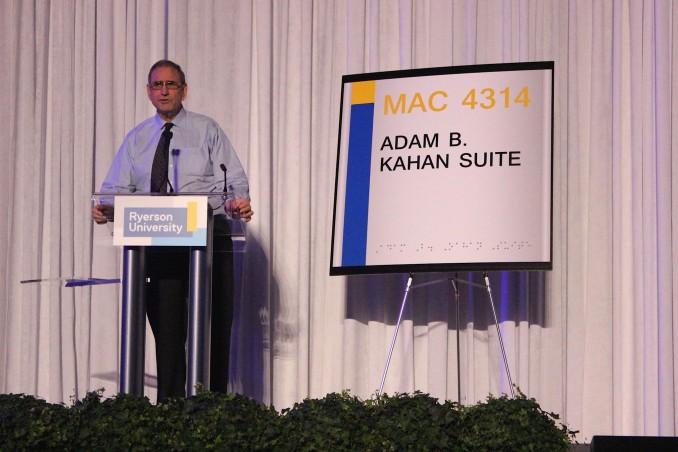Adam Kahan, the vice-president university advancement, is leaving on December 10. Reporter Natalia Balcerzak sat down for a Q&A with the man who’s partially responsible for putting Ryerson on the map.
What are you proudest achievements at Ryerson?
I guess, my proudest achievements would be first the re-branding of the university – really creating a presence and awareness of the university through a concentrated branding effort. That plays out in many different way, one in which is the creation of signage so basically flaunting, if I could put it that way, where we are by putting up RU banners and all sorts of signs because prior to when I came here, there was virtually no signage on the campus.
There was a movie once called, “Being There” and I adopted the concept of being there, which means that we have to be everywhere that matters. So we have to be in other organizations, events. We have to be all over the city. We have to be telling the Ryerson story wherever we can so there is a pretty comprehensive branding plan to re-establish the presence of the university and to be able to talk about its reputation.
And secondly, the innovational and entrepreneurship agenda. Being a part of the team that nurtured this notion that that the university should be a place that supports innovation and entrepreneurship as much as it does as a place that creates knowledge and transmits knowledges.
What is the Ryerson story to you?
The Ryerson story is about metamorphosis. It’s about a university that had a certain image back in 2003 that was just emerging. It was the contextualization of the university’s focus of what has become a comprehensive research university.
The Ryerson story – as we talked about with entrepreneurship and innovation – we’ve pioneered that notion in post-secondary institution of what that means in the university context.
So, when we spawn things – like we did in 2010 of the Digital Media Zone and the new zones that were created – that wasn’t exactly what university were predominantly doing here but now everyone’s doing it.
How do you see that change in students, in their approach to academics?
I certainly have seen the incredible change in students wanting an entrepreneurial approach to their lives and I mean the DMZ basically all started, initially, with a number of students at the university who came to see the President and myself to ask us if we can help them because they had this idea that they wanted to develop.
It was really out of that kind of interaction that Sheldon got the notion that we need to do something to support these people.
What makes Ryerson so unique?
I think the core pieces that we wanted to define ourselves as a downtown, Torontonian urban, edgy university. We used to get a lot of approaches overtime to build a satellite campus elsewhere [but we made it clear that] we’re part of the downtown core and that’s where we want to be.
One of the way I used to put it as the change was going. Sheldon has some favourite phrases… one of them which was “To be different but not odd,” and the other was, “To be the best at something that matter.”
How does it make you feel seeing posters of Ryerson around Toronto?
One of the first things I did in terms of planning was I went to the board, asked for money so that we could put our image everywhere where we possibly could – on the streets, on the buildings, anywhere… so that people could not go anywhere without confronting Ryerson.
It was a strategic plan to create our presence in the downtown core and I say it’s critically important as a definition of our space.
What can your successor expect?
Well, I hope a very solid foundation of what the whole university advancement. It’s an interesting dilemma – from one end, you have to be committed to maintaining the momentum that this university has got and the track that we’ve developed. On the other hand, the new administration are going to want to make their own mark.
What lessons have you learned?
I think I’ve learned, and it sounds kind of hinky, but I learned about the institution that it has a common purpose.
When I first got here, I didn’t feel that everyone was pulling together for the reputation at the university.
In recent years, you feel it with everywhere now — the students, the faculty, the staff, the administration — everyone’s pulling in the same direction and has this hungry ambitious to be successful, no matter what and all wanting to do it together.
Where do you see Ryerson in a decade?
I’d like for the momentum and track that it’s on to be increased and enhanced. I think it has to develop as a central core research institution so it can continue to set the standards in its teaching.
I think the other thing, is that one of Ryerson’s distinctive aspects was that it came out of being a polytechnic university where it was known to be real-world relative and connective. I wouldn’t it seen to be lost, I’d like for it to be a trendsetter for what is relative education and that it will continue to connect to the realities of society.
I think the university at one point will get a law school and a medical school. We’re doing a lot in law and medicine already.
Do you think you’ve made your mark at Ryerson?
I hope so. I think that’s probably more for others to determine than for myself. I’m pleased with the things that we’ve achieved but there’s always room to do more.










Leave a Reply